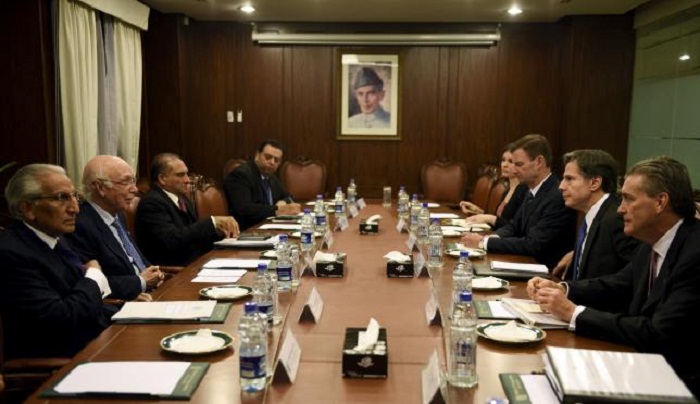While the main focus of the two-day meeting in the Pakistani capital, which began on Tuesday, is Afghanistan, Indian Foreign Minister Sushma Swaraj is attending, offering a chance for India and Pakistan to breathe life into efforts to improve their ties.
U.S. Deputy Secretary of State Antony Blinken is also attending and he called on Tuesday for Pakistan to use its influence with the Afghan Taliban to push for Afghan reconciliation.
But slim hopes for a resumption of Afghan talks were underlined by a Taliban raid on the airport in the southern Afghan city of Kandahar which began on Tuesday evening.
Fighting between the militants and Afghan security forces was continuing on Wednesday and at least 18 people had been killed, Afghan officials said.
Cooperation between Afghanistan and Pakistan is seen as essential for Afghan peace but hopes for warmer ties after Afghan President Ashraf Ghani was inaugurated last year were quickly dashed, largely because of a series of bomb attacks in Kabul.
Ghani told the conference "enemies" had unsuccessfully tried to divide Afghanistan but they had been foiled. He blamed "regional and international terror groups" for the violence in his country.
"In the past, there has been the temptation to use non-state actors as instruments of foreign policy," he added, in a clear reference to Afghan assertions that Pakistan supports the Taliban to maintain influence in Afghanistan.
Pakistan denies that.
"I have had to become a war president, because an all-out war has been imposed on us," Ghani said.
`SECURITY RISK`
Pakistani Prime Minister Nawaz Sharif stressed his commitment to "an Afghan-led and Afghan-owned reconciliation process", a reference to the talks between the Afghan government and the Taliban, hosted by Pakistan, that foundered after one round in July.
The negotiations were derailed after news leaked that Taliban founder Mullah Mohammad Omar had been dead for two years. Omar`s deputy, Mullah Akhtar Mansour, took over as leader but violent splits subsequently emerged in the militant group.
Sharif also spoke of Pakistan`s aim to repatriate the 2 million Afghan refugees in Pakistan, some of whom have been in Pakistan for decades.
"The massive cross-border movement of refugees constitutes a security risk," Sharif said.
In response, Ghani pointed out that an offensive by the Pakistani military against Pakistani Taliban has sent an influx of Pakistanis into Afghanistan.
"Unfortunately, recent events in Pakistan have forced us to host 350,000 to 500,000 refugees from Pakistan ... the refugee issue is a common issue, like all issues," Ghani said.
But leaders will be mindful of their domestic audiences and will want to look resolute.
Afghanistan and Pakistan accuse each other of supporting Taliban insurgencies across their border. The two insurgencies are separate but allied.
More about:
















































